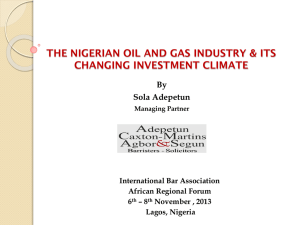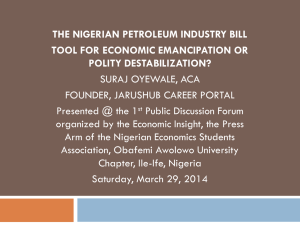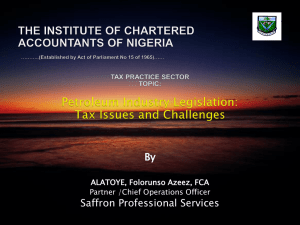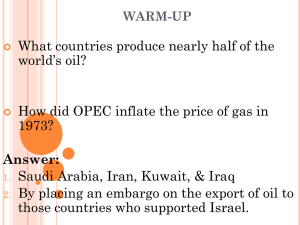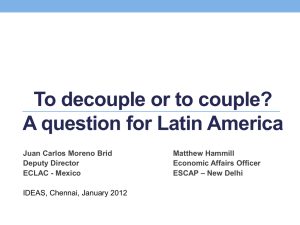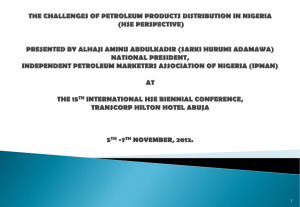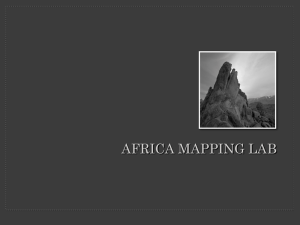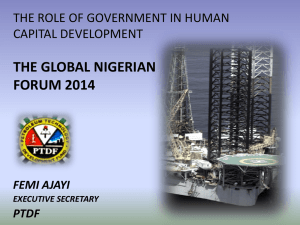the power point presentation
advertisement
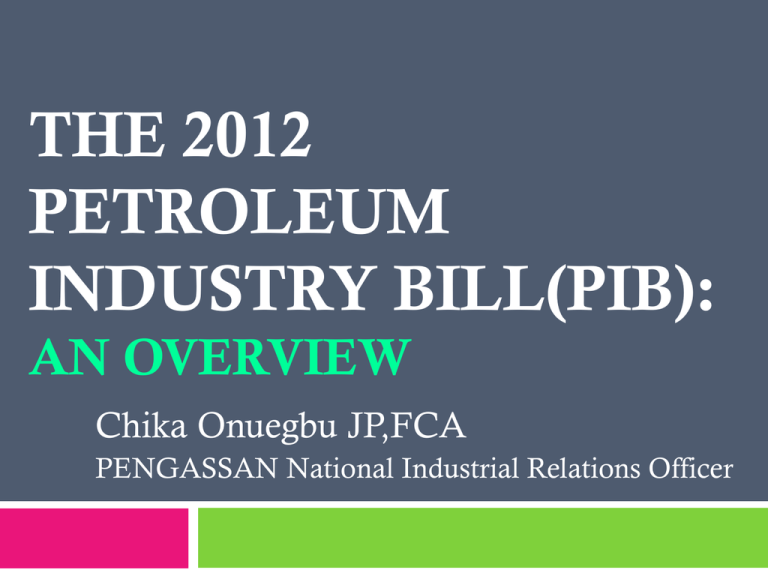
THE 2012 PETROLEUM INDUSTRY BILL(PIB): AN OVERVIEW Chika Onuegbu JP,FCA PENGASSAN National Industrial Relations Officer The Nigeria Petroleum Industry Reforms started long time ago 24th Apr 7th Sept Inauguration of OGIC 2000 2001 Re-Inauguration of OGIC 2002 2003 2004 Draft National Oil & Gas Policy 2004 2005 2006 2007 Approval of National Oil & Gas Policy 5th Sept, 2007 PIB 2008 2009 2010-12 OGIC Report completed May 2008 Phase-1 Phase-2 Policy Legislation Unfortunately the PIB was not passed during the 6th National Assembly PIB FEC Submission 2008 Public Hearings Senate Committee Recommenda tions NASS Passage 3 Mar 2011 Dec 2010 Jul 2009 Memoranda; IAT SB 236 House Committee Recommen dations IAT HB 159 (+170 clauses) NASS Harmonisation Presidential Assent … and so the Fed Govt was advised to re-start the whole process over …Journey to the 2012 Petroleum Industry Bill(PIB) Special PIB Task Force led by Senator Udo Udoma was set in January 2012 to work with relevant government bodies to produce a new version of the PIB for presentation to the National Assembly. The PIB Technical Committee was headed by the Director of DPR Osten Oloronsola. The Task Force was directed to consult with key stakeholders and to liaise with the National Assembly to ensure the quick passage of the 2012 PIB The Special Task Force on PIB submitted its report in June 2012 to the Presidency Federal Executive Council of Nigeria approved the PIB on 11 July 2012 The Presidency upon the approval of the Federal Executive Council (FEC)forwarded the 2012 PIB to the National Assembly on 18th July 2012 The bill is now before the National Assembly Any moment from now the National Assembly will call for public hearing. … So how ready is PENGASSAN for the public hearing? …Journey to the 2012 Petroleum Industry Bill (PIB) cont’d PENGASSAN National Secretariat set up a PIB Committee made up as follows: 1. Comrade Chika Onuegbu Chairman 2. Comrade Zaid Kolawole Member 3. Comrade M. B. Saidu Member 4. Comrade (Rev.) S. F. Oginni Member 5. Comrade Chinedu Ajabor Member 6. Comrade Tony Nwoha Member 7. Comrade Seyi Gambo Member 8. Comrade Azubuike M. Azubuike Member 9. Comrade Emmanuel Onuorah Member 10. Comrade Bayo Olowoshile Co-opted Member 11. Comrade Babatunde Oke Secretary The PENGASSAN PIB Committee had an interactive session with the Senator Udo Udoma Federal Govt Task Force on PIB and the Osten Oloronsola Technical Committee on PIB on April 11, 2012 in FCT Abuja. The PENGASSAN PIB Committee obtained and circulated the PIB submitted by the Presidency to the Senate to all our branches and members for their review and inputs. However the response was not encouraging as many branches did not respond. For instance among the PF family only Total E&P submitted a position to the PENGASSAN PIB Committee. Overview of the 2012 PIB The 2012 PIB: Is a 223 page document ;comprises 363 sections divided into 9 parts with 5 schedules. Provides for the legal, fiscal and regulatory framework for the oil and gas industry. Note that some sections of the PIB were not correctly numbered. E.g. no section 119 Create two regulatory entities. The Upstream Petroleum Inspectorate and the Downstream Petroleum Regulatory Agency Provides for Host Community Fund ; Upholds in its entirety the Nigerian Oil and Gas Industry Content Development Act 2010 Split the NNPC into three entities; two incorporated, one not. Subjects the Petroleum industry to heavy political manipulations &interference, which could lay foundation for unrivalled corruption .e.g. Presidential power to grant licenses and leases without competitive process or any other process; Excessive powers of the Minister of Petroleum including the power to determine rentals and royalties by regulation; recommend all persons to the boards; chairman most of the boards ;make regulations without public hearing etc.; power to receive gifts by the agencies; non application of fiscal responsibility and public procurement acts for many agencies Introduces new fiscal framework for the oil and gas industry; NHC, CIT and Royalties No mention of refining or refining operations other than in Section 220 (2)(b) which mentions that regulations may be made for these operations. Meanwhile there is a refinery Bill in the senate. Its outcome will determine the future of the Nigerian oil and gas industry , as well as the Nigerian workers. Most influential and important legislation after the Nigerian constitution Overview of the 2012 PIB cont’d The 9 parts of the PIB are: Part I. Objectives (Sections 1 to 4) Part II. Institutions (Sections 5 to 169) Part III. Upstream Petroleum (Sections 170 to 205) Part IV. Downstream Licensing (Sections 206 to 220) Part V. Downstream Petroleum (Sections 221 to 283) Part VI. Indigenous Petroleum Companies (Sections 284 to 288) Part VII. Health Safety and Environment (Sections 289 to 298) Part VIII Provisions on Taxation in the Petroleum Industry (299 to 353) Part IX Repeals, Transitional and Savings Provisions (Sections 354 to 363) Overview of the 2012 PIB cont’d The 5 Schedules of the PIB are: First Schedule. Rights of Pre-emption Second Schedule. Supplementary Provision Relating to the Proceedings of the Boards of institutions under this Act: Third Schedule. Powers and Duties of the services under the Act: Fourth Schedule. Capital Allowances Fifth Schedule. Production Allowances OBJECTIVES OF THE 2012 PIB (s.1) Create a conducive business environment for petroleum operations; Enhance exploration and exploitation of petroleum resources in Nigeria for the benefit of the Nigerian people Optimize domestic gas supplies, particularly for power generation and industrial development Establish a progressive fiscal framework that encourages further investment in the petroleum industry while optimizing revenues accruing to the Government Establish commercially oriented and profit driven oil and gas entities; Deregulate and liberalize the downstream petroleum sector; Create efficient and effective regulatory agencies; Promote transparency and openness in the administration of the petroleum resources of Nigeria Promote the development of Nigerian content in the petroleum industry Protect health, safety and the environment in the course of petroleum operations; and Attain such other objectives to promote a viable and sustainable petroleum industry in Nigeria 2012 PIB: BROAD POLICY THRUST FOR PENGASSAN 1 0 2012 PIB – Broad Policy Thrust for PENGASSAN Transparency and Accountability : Competitive, non-discretionary licensing and tender processes for all contracts and licenses. Specific provisions for Voiding ALL confidentiality clauses for oil revenue and payment information The reduction to the barest minimun of all discretionary powers and political interference in the running of the agencies set up by the PIB Sincere and genuine pursuit of transparency and accountability as key enabler of business growth in the nation’s petroleum industry and sustained economic development of Nigeria Specific provisions for Publication at least on a quarterly basis the comprehensive production, export and import figures Specific provisions for Publication of NNPC/ NOC/ National Petroleum Asset Management Corporation/Host Community Funds annual reports and audits online as the case with the multinationals 2012 PIB – Broad Policy Thrust for PENGASSAN cont’d Balance b/w Government Take & Industry Growth: PENGASSAN believes that there should be a good balance between government take (royalties, Tax etc) and industry growth. The PIB should optimise the returns to Nigeria from its oil and gas resources without stifling investments and growth of the industry. Our position is informed by the lessons presented in Economic theory by Laffer curve. The PIB should provide a fiscal regime that is competitive and that will encourage investments in critical areas of the Nigerian oil and gas sector. This position is furthered strengthened by the discovery of oil and gas in the Gulf of guinea , Dahomey regions and similarly close regions; and the urgent need for the development of gas and power, local refining capacity etc. 2012 PIB – Broad Policy Thrust for PENGASSAN Cont’d Labour Issues : PENGASSAN supports the PIB in principle, provided the following are fully met : There is mandatory recognition of the right to freedom of association and effective collective bargaining by all companies operating or doing business in the Nigeria oil and gas industry irrespective of where they are located . The PIB ensures that all companies operating in the Nigerian oil and Gas industry comply with all international labour conventions that have been ratified by Nigeria; the collective agreements with the labour unions and the extant labour laws as a minimum in all their dealings with the Nigerian workers and their representatives. All Workers in the NNPC and ALL other government agencies to be impacted by the PIB shall transit to the new companies/agencies on same terms and conditions. This is crucial to the successful take-off of these agencies, the NOC and the PIB itself. 2012 PIB – Main Policy Thrust for PENGASSAN cont’d Labour Issues Contd : Proper arrangements should be made in the PIB to ensure that the liabilities of the NNPC and other agencies to their staff such as pensions to retired and existing employees are adequately provided for prior to the effective commence date of the PIB. Ensure that companies operating in the oil and gas industry do not use the PIB as a ploy to disengage Nigerians. To this end, the PIB should give the Upstream Petroleum Inspectorate (UPI) the power to protect the jobs of Nigerians working in the oil and gas industry such that no Nigerian will be relieved of his/her job in the Nigerian oil and gas industry without the approval in writing of the Upstream Petroleum Inspectorate (UPI). This will ensure the reduction of anti-labour practices and engender industrial peace and harmony Strengthen the Nigerian Content Act and policies especially as relates to labour, training and manpower development 2012 PIB – Broad Policy Thrust for PENGASSAN cont’d Membership of All Boards in the PIB : Workers and their unions are strategic partners and stakeholders whose participation, initiatives, drive and inputs are important for the successful operations of the oil and gas industry. Consequently we demand for one representative EACH of PENGASSAN and NUPENG, in ALL the boards and committees set up in the PIB as strategic partners with cognate industry knowledge 2012 PIB: INSTITUTIONS 1 6 Structure of Institutions under the PIB NPAMC NGC Assets NPDC Assets REFINERIES PSCs, PPMC, NLNG, ETC 6 JVs PTDF, PEF, PTI, NCDMB, PHCF PIB Institutions 1. The Minister - Supervision + Policy 2. Petroleum Technical Bureau – PTB; Special Unit of the Office of the Minister 3. Upstream Petroleum Inspectorate – UPI; Independent? Regulator, Upstream 4. Downstream Petroleum Regulatory Agency – DPRA; Independent? Regulator, Downstream 5. Petroleum Technology Development Fund - PTDF; Capacity development PIB Institutions Cont’d 6. Petroleum Equalisation Fund - PEF;…..Collects net surplus revenue from petroleum products marketing companies . Will manage subsidy fund post PIB 7. Petroleum Host Community Fund – PHCF; FTO issues, security of facilities 8. National Petroleum Assets Management Corporation- NPAMC;………JV Operations 9. National Oil Company – NOC; Commercial 10. National Gas Company Plc.; Commercial PIB Institutional Alignment 1. Minister of Petroleum Policy Regulation Operations Minister UPI NOC PTB DPRA NGC plc. PHCF PTB? NPAMC International / Indigenous OCs PIB Institutional Alignment Cont’d 2. The Petroleum Technical Bureau (PTB) A special Unit of the Office of the Minister Provide technical and professional support to the Minister Assist the minister in formulation strategies to implement government policies in the Petroleum Industry(PI) Assist the minister in monitoring the implementation of government policy in the PI In addition to its other duties carry out the functions of the former Frontier Exploration Services (FES) of the NNPC ***No information on staffing structure PIB Institutional Alignment Cont’d 3. Upstream Petroleum Inspectorate (UPI) Upstream Regulator With the approval of the Minister, allocate petroleum production quotas Execute government policies assigned to it by the Minister Regulate all technical aspects of the upstream sector Regulate commercial activities within the upstream sector Determine and ensure implementation and maintenance of technical standards and specifications Administer and enforce policies, laws and regulations relating to upstream operations PIB Institutional Alignment Cont’d 4. Upstream Petroleum Inspectorate (UPI) Members to be appointed by the President on recommendation of the Minister Structuring the Inspectorate into such number of departments as is deemed fit for the effective discharge of its functions will be subject to the approval of the Minister The Board shall appoint a Secretary for the Inspectorate PIB Institutional Alignment Cont’d ***UPI Board Chairman * Director General 2 Directors of the Inspectorate 2 persons (min. Directors) of the Ministry of Petroleum Resources 1 person (min. Director) from the Federal Ministry of Finance 1 representative from NUPENG * 1 representative from PENGASSAN * 3 others ** ***4-yr terms renewable for no more than additional 4 years *Part-time PIB Institutional Alignment Cont’d 5. Downstream Petroleum Regulatory Agency (DPRA) Downstream Regulator With the approval of the Minister, allocate petroleum production quotas Facilitate the supply of gas to the strategic sectors Execute government policies assigned to it by the Minister Regulate all technical aspects of the downstream sector Regulate commercial activities within the downstream sector Determine and ensure implementation and maintenance of technical standards and specifications Administer and enforce policies, laws and regulations relating to downstream operations PIB Institutional Alignment Cont’d 6. DPRA Board Members to be appointed by the President on recommendation of the Minister Structuring into such number of departments as is deemed fit for the effective discharge of its functions will be subject to the approval of the Minister PIB Institutional Alignment Cont’d DPRA Board Chairman *** Director General** 2 Directors of the Inspectorate 2 persons (min. Directors) of the Ministry of Petroleum Resources 1 person (min. Director) from the Federal Ministry of Finance 1 representative from NUPENG* 1 representative from PENGASSAN* 3 others *** **4-yr terms renewable for no more than additional 4 years *Part-time PIB Institutional Alignment Cont’d 7. Petroleum Technology Development Fund (PTDF) Develop local human capacity for the oil and gas sector through but not limited to: Provision of scholarships and bursaries, wholly or partially in universities, institutions and in petroleum undertakings in Nigeria or abroad Making suitable endowments to faculties in Nigeria universities, college, or institutions Liaising with research centres in Nigeria and abroad on the adaptation of technology and innovations appropriate to the needs of the Nigerian petroleum industry Enhancement and development of infrastructure in tertiary institutions that provide courses of study relevant to the petroleum industry PIB Institutional Alignment Cont’d PTDF Board The Board shall appoint a Secretary for the Inspectorate Minister as Chairman 1 person (min. Director) from the Federal Ministry of Finance 1 person (min. Director) from the UPI 1 representative from the Nigerian Content Development and Monitoring Board (NCDMB) The Executive Secretary of the PTDF The Principal, PTI A representative of the Society of Petroleum Engineers A representative of the Society of Engineers 6 persons from the 6 geopolitical zones to be appointed by the President on recommendation of the Minister * Part-time 4-year terms and renewable for another 4 years. PIB Institutional Alignment Cont’d 8. Petroleum Equalization Fund (PEF) Shall continue to be the PEF into which shall be paid: Any net surplus revenue recovered from petroleum products marketing companies pursuant to this Act Such sums as may be provided for purpose of the Equalization Fund by the Federal Government Manage the Subsidy fund post PIB Exist only as long as there is subsidy on petroleum products PIB Institutional Alignment Cont’d PEF Board The Board shall appoint a Secretary for the Fund Minister as Chairman The Executive Secretary of the PEF 1 person from the Federal Ministry of Finance 1 person from the Ministry of Petroleum Resources 1 person from the PEF 1 person from the National Association of Road Transport Workers 1 representative of the Major Marketers Association of Nigeria 1 representative of the Independent Petroleum Marketers Association of Nigeria 1 representative each of the NLC and the TUC of Nigerian 3 persons to be appointed by the President on recommendation of the Minister * Part-time 4-year terms and renewable for another 4 years. PIB Institutional Alignment Cont’d 9. Petroleum Host Communities Fund (PHCF) Utilized for the development of the economic and social infrastructure of the communities within the petroleum producing areas. Every upstream petroleum-producing company shall remit on a monthly basis 10% of its net profit: onshore, shallow waters and offshore- remittance to be made directly into the PHCF Deep-water areas – remittance directly to the Fund for the benefit of the petroleum producing littoral States PIB Institutional Alignment Cont’d Petroleum Host Community Fund Profits generated Profits generated 10% 10% PPHC Fund 90% Community Funds (PML cover) 1) 2) 3) Share for Communities Fund 10% Strategic Community Fund There shall be established a Petroleum Producing Host Communities Fund (“Fund”). The total value of the fund will be equal to 10% of the Profits (defined as Total Revenues minus Royalties and minus Costs minus Tax). The fund shall consist of two main components:1) A direct Community Fund which shall be maximum of 90% of the PPHC, which shall be remitted to Communities covered by PMLs 2) A Strategic Community Fund which shall be maximum of 10% of the PPHC, to be utilized for communities not covered by PMLs. Distribution of the funds to each community will be guided by regulations to be promulgated by the Minister of Petroleum Resources 100% State Governments of 8 littoral states The new Bill establishes the Host Communities Trust Fund, but does not define “host community’ rendering that description amenable to several interpretations. PIB Institutional Alignment Cont’d 10. National Petroleum Assets Management Corporation (NPAMC) A holding company operating fully on commercial principles: Acquire and manage investments of the government in the Nigerian upstream petroleum industry Undertake such other activities as are necessary or expedient for giving full effect for the performance of its functions e.g. acquisition and maintenance of subsidiaries Funding: (1) monies made available by the government for the purpose of funding the subsidiaries (2) such monies as may be received by the Corporation in the course of its operations The NPAMC, though incorporated under the Companies and Allied Matters Act, but shall not be subject to the provisions of the Fiscal Responsibility Act and Public Procurement Act, both of 2007 Following the incorporation of the NPAMC, assets and liabilities comprising exclusively the interest in all the unincorporated joint ventures held by the NNPC and excluding the assets that the government may have vested in the NOC shall be vested in the NPAMC (12-24 months) PIB Institutional Alignment Cont’d NPAMC Board ***UPI Board a. Minister as Chairman b. The PS, Federal Ministry of Finance c. MD of the Management Company (Subsidiary to be established by the Corporation) d. 2 persons to be appointed by the president PIB Institutional Alignment Cont’d 11. National Oil Company (NOC) A public company limited by shares and vested with certain assets and liabilities of the NNPC (to be incorporated no later than 3 months after the effective date)…Initial shares to be held by a nominee of the MPR and MOF incorporated on behalf of the Federal Government: Within 6 years from the date of incorporation of the NOC: up to 30% of the authorized shares of the NOC shall be divested to the public Following the incorporation of the NOC, assets and liabilities held by the NNPC except the interests in the unincorporated joint ventures and Nigerian Gas Company Limited shall be vested on the NOC within 12-24 months from the effective date The NOC shall be subject to the Governance rules of the SEC The NOC shall not be subject to the provisions of the Fiscal Responsibility Act and Public Procurement Act, both of 2007 PIB Institutional Alignment Cont’d 12. National Gas Company PLC (NGC Plc.) A public company limited by shares and vested with certain assets and liabilities of the NNPC: Within 6 year from the date of incorporation of the NGC Plc.: up to 40% of the authorized shares of the NGC Plc. shall be divested to the public Following the incorporation of the NGC Plc., assets and liabilities held by the NNPC except the Nigerian Gas Company PLC shall be vested on the NGC Plc. within 12-24 months from the effective date The NGC Plc. shall be subject to the Governance rules of the SEC The NGC Plc. shall not be subject to the provisions of the Fiscal Responsibility Act and Public Procurement Act, both of 2007 166: prior to vesting of the assets and liabilities of the NNPC on the NGC Plc., the Minster may give to the Board of Directors of NNPC directions in writing and the BOD shall comply with every such direction PIB Institutional Alignment Cont’d 13. Other Institutions 1. The Petroleum Training Institute (PTI), established by the PTI Act 2004 shall remain a parastatal supervised by the Minister 2. The Nigerian Content Development and Monitoring Board, established by the Nigerian Oil and Gas Industry Content Development Act 2010, shall remain a parastatal under the Minister 2012 PIB Institutions :COMPARATIVE ANALYSIS AGENCIES Petroleum Technical Bureau Upstream Petroleum Inspectorate FUNCTIONS BOARD C E O’s Specified. Pg 16 Not Specified Not Specified sec. 10 Specified. Pg 19 Specified pg 21 Specified. Pg 24 sec. 15 sec.17 (NUPENG sec. 23 & PENGASSAN) STAFF Specified. Pg 17 sec. 11 Specified. Pg 26 sec. 28 COS FUNDING Specified. Pg 17 Not Specified sec. 11 (2) Specified. Pg 27 Specified. Pg 26 sec. 32 sec. 30 REMUNERATION Specified. Pg 17 sec. 11 (2) Specified. Pg 24 sec. 24 & pg 26 sec 29 Oil & Gas Downstream Petroleum Regulatory Agency Petroleum Technology Development Fund Petroleum Equalization Fund Management Board Petroleum Host Community Fund Specified. Pg 32 Specified. Pg 36 Specified. Pg 39 Specified. Pg 40 Specified. Pg 41 Specified. Pg 42 Specified. Pg 37 sec. 45 sec. 47 (NUPENG sec. 53 sec. 58 sec. 59 sec. 62 sec. 49, pg 39 & PENGASSAN) sec 54 PENSION Specified. Pg 17 sec. 12 (1&2) Specified. Pg 26 sec. 30 Specified. Pg 41 sec. 60 Specified. Pg 48 Specified. Pg 48 Specified. Pg 51 Specified. Pg 53 Specified. Pg 53 Specified. Pg 46 Specified. Pg 50 Specified. Pg 53 sec. 76 sec. 77 sec. 84 Sec. 88 Sec. 88 (3) Sec. 74, pg 47 sec. 79, pg 52 sec Sec. 90 Sec. 75 85, pg 53 sec 89 Oil & Gas Specified. Pg 58 Specified. Pg 57 Specified. Pg 59 Specified. Pg 60 Not Specified Specified. Pg 60 Not Specified Not Specified sec. 103 Sec. 101. NLC, Sec. 105 Sec. 107 Sec. 108 (Note pg TUC 56 sec 100 (4) Specified. Pg 63 Not Specified sec. 118 Not Specified Not Specified Not Specified Specified. Pg 63 Not Specified sec. 118 (a & b) Not Specified 2012 PIB Institutions :COMPARATIVE ANALYSIS Cont’d AGENCIES Nigerian Petroleum Assets Management Company Limited National Oil Company FUNCTIONS BOARD Specified. Pg 64 Specified. Pg 68 sec. 120 sec. 131 C E O’s STAFF COS FUNDING Not Specified. Transfer of staff, Transfer of staff, Specified. Pg 64 However, MD as a etc pg 189 Sec etc pg 189 Sec sec. 121 board member 356 356 REMUNERATION PENSION Specified. Pg 52 Transfer of staff, sec. 85, pg 53 sec. etc pg 189 Sec 89 pg 69 sec. 133, 356 Oil & Gas Transition from Transition from Not Specified Transfer of staff, Transfer of staff Transition from Transfer of staff, Transfer of staff, NNPC NNPC. Pg 76 sec. etc pg 189 Sec etc pg 189 Sec NNPC. Pg 76 sec. etc pg 189 Sec etc pg 189 Sec Pg 76 sec 155 155 356 356 155 356 356 National Gas Transition from Transition from Not Specified Transfer of staff, Transfer of staff, Transition from Transfer of staff, Transfer of staff, Company Plc NNPC NNPC etc pg 189 Sec etc pg 189 Sec NNPC etc pg 189 Sec etc pg 189 Sec Pg 76 sec 155 Pg 76 sec 155 356 356 Pg 76 sec 155 356 356 Petroleum PTI Act, CAP. 16 of PTI Act, CAP. 16 of PTI Act, CAP. 16 of PTI Act, CAP. 16 of PTI Act, CAP. 16 of PTI Act, CAP. 16 of PTI Act, CAP. 16 of PTI Act, CAP. 16 of Training Institute the Laws of the the Laws of the the Laws of the the Laws of the the Laws of the the Laws of the the Laws of the the Laws of the Nigerian Content NOGICD Act 2010 NOGICD Act 2010 NOGICD Act 2010 NOGICD Act 2010 NOGICD Act 2010 NOGICD Act 2010 NOGICD Act 2010 NOGICD Act 2010 Development & Monitoring Board NB: The present NNPC will become 3 companies-National Oil Company Plc (Government 70% ;30% will be made available to members of the public. ), National Gas Company Plc – (present NGC, govt 51% ,49% to public) and National Petroleum Asset Management Corporation - this will be a holding company fully-owned by the government 2012 PIB: FISCAL FRAMEWORK 4 1 2012 PIB: Fiscal Framework DESIGN CONSIDERATIONS and Thrust of Federal Government: A main objective of the PIB is to –’Establish a progressive fiscal framework that encourages further investment in the petroleum industry while optimizing revenues accruing to the Government’. The design considerations for Fiscal framework according to the federal government technical subcommittee on PIB led by Osten Olorunsola are to: Improve overall competitiveness in the oil and gas sector. Maintain per cent government revenues from onshore/swamp and shallow offshore for crude oil and condensate at the current level. Increase government revenues from deep-water PSC operations, through adjusted royalty rates. Create attractive fiscal terms for gas in all terrains. Improve savings index by reducing tax rate (Sole risk/JV) and eliminating investment based fiscal incentives. Special incentive provisions (increased production allowances) included for PSCs in onshore/swamp/shallow offshore to partially compensate for investor value erosion compared to sole risk operators in these terrains. 2012 PIB: Fiscal Framework Cont’d Principles for Royalties and Tax : Fiscal regime (Royalty and Tax) predicated on production as opposed to terrain and investment respectively Royalty by Production Captures the output of a company as opposed to its location Creates a fair balance between small and big producers operating in the same terrain Enables operators to continue to make fair returns during field decline Royalty by Price Trigger mechanism is fair to all irrespective of the terrain Self adjusting rate based on the price of crude oil Abrogation of Royalty by Terrain 2012 PIB: Fiscal Framework Cont’d The Nigerian Hydrocarbon Tax (Sections 299 – 352) which shall be administered & collected by the Federal Inland Revenue Service. S.313 provides for the following as assessable tax : 50% for onshore and shallow water areas 25% for bitumen, frontier acreages and deep water areas Where petroleum operations fall in geographical areas that are subject to different tax rates, NHT shall be levied on the proportionate parts of the profits arising from such operations. The Company Income Tax ( Section353, page 184): Previously, in the upstream sector, companies’ income tax (CIT) is only levied on gas profits. Under the PIB, CIT will be 30% of all assessable profits, and is not deductible from NHT. There are incentives in the Companies Income Tax Act such as tax holidays which will be retained for LNG companies. A tax holiday is also available for any company which supplies gas solely for the domestic market. It is important to note that the PIB does not amend/delete paragraph (h) of section 19(1) of the CIT Act, Cap 60, LFN, 1990, which exempts “the profits of any company engaged in petroleum operations” from CIT. It may be expedient for the Bill to specifically delete this paragraph to avoid potential controversy on the liability of profits derived from petroleum operations to CIT. 2012 PIB: Fiscal Framework Cont’d Royalties(Section 197): The PIB does not specify the basis and percentage of royalties to be paid by companies engaged in petroleum operations. However, the Bill empowers the Minister for Petroleum Resources (‘the Minister’) to make regulations in that regard. However it is expected that royalties will be by price and production rather than the current practice where it is by terrain. Contributions to the Petroleum Host Communities Fund (Sections 116 – 118): All upstream petroleum producing companies shall remit, on a monthly basis, to the Petroleum Host Community Fund (PHC Fund), 10% of net profits from their onshore, shallow water and deep water operations. “Net profit” is defined in the PIB as “the adjusted profit less royalty, allowable deductions and allowances, NHT and companies income tax.” However under the current regime, all producing and gas processing companies operating onshore and offshore in the Niger-Delta area are required to contribute 3% of their total annual budget to the Niger-Delta Development Commission Fund (NDDC Fund) pursuant to the Niger-Delta Development Commission (Establishment) Act (NDDC Act). Since the NDDC Act is not one of the statutes listed for repeal under the PIB ,Companies will to contribute to the PHC Fund and the NDDC Fund. Contributions made by a company to the PHCF are to be set off against its ‘total fiscal rent obligations’. Fiscal rent is the aggregate of royalty, Nigerian Hydrocarbon Tax and Companies Income Tax obligations arising from upstream petroleum operations. 2012 PIB: Fiscal Framework Cont’d Penalty for Gas Flaring (Sections 275 – 283): The PIB prohibits the flaring of natural gas after a ‘flare-out date’ to be specified by the Minister via regulations. Based on section 306(k) of the PIB, gas flaring penalty will not qualify as a tax deductible expense, as is currently the case. Payment of Renewal Bonus (Section 185): Section 185(2) requires lessees under a PML arrangement to pay “a renewal bonus of an amount specified in the lease” at the time of renewing the PML. Based on section 306(l) of the PIB, renewal bonuses are specifically disallowed for NHT purposes. 2012 PIB: Fiscal Framework Cont’d Deductions Allowed: for tax purposes are: expenses wholly, exclusively, necessarily and reasonably incurred for the purpose of upstream petroleum operations. Sums ‘set aside in a fund’ as decommissioning and abandonment expenditure have now been explicitly specified as tax-deductible. This implies that only funded provisions would be allowable Interest incurred on capital employed for upstream petroleum operations is tax deductible, except where the interest relates to operations under a Production Sharing Contract (PSC) Contributions to the Petroleum Host Communities Fund are allowable Contributions to pension and other similar schemes/funds are taxdeductible. The need to obtain approval for these contributions has been removed, as long as the scheme/fund is in line with the Pension Reform Act. 2012 PIB: Fiscal Framework Cont’d Deductions Disallowed deductions include: all general, administrative and overhead expenses incurred outside Nigeria in excess of 1% of capital expenditure and 20% of any expenses incurred outside Nigeria except for goods or services not available domestically in the required quantity or quality. legal and arbitration costs related to cases against the tax authorities or the Federal Government except awarded to the company during the legal or arbitration process . Others include costs incurred in organising or managing any partnership, joint venture or other arrangement between or among companies, gas flaring charges, insurance costs payable to an affiliate of the company, any signature or production bonuses costs of obtaining and maintenance of a performance bond under a PSC Any cost arising from fraud, wilful misconduct or negligence on the part of the company 2012 PIB: Fiscal Framework Cont’d The requirement to pay CIT (in addition to the NHT) is not new in the taxation of petroleum companies in other jurisdictions. However, The rates of the two tax types, together with other fiscal provisions of the PIB, will most likely result in an increase in the effective tax rate of many companies under the PIB regime. This is a contentious issue as the govt claim that the effective increase is just 1%. However the IOCs disagree and cite for instance that: PSC companies that currently pay PPT at a rate of 50% of chargeable profits, will be liable to NHT and CIT at a combined rate of about 55% (i.e., 30% CIT plus 25% NHT). This is aside from the fact that the companies will give up the relatively more favourable Investment Tax Credit (ITC) /Investment Tax allowance (ITA) that currently applies, for Production Allowance (PA)and General Production Allowance (GPA) JV companies that are yet to fully amortise their capitalised pre-production expenses are currently liable to PPT at a reduced rate of 65.75%; whereas they will be liable to NHT and CIT at a total rate of about 80% under the new regime. JV companies that currently pay PPT at 85%, it would appear on the surface that they will pay lower corporate tax at a total rate of 80% under the PIB. However, considering that the companies will no longer enjoy PIA, will not be entitled to PAs and GPAs except for gas operations, and may have a significant proportion of their offshore expenses disallowed, the companies may well have a higher effective tax under the PIB. 2012 PIB: Fiscal Framework Cont’d Offshore/Onshore/Swamp/Shallow :Tax rates and other allowances Comparison Current Terms Taxes/allowances Proposed Terms Taxes/Allowances Petroleum Profits Tax During cost recovery (yr1 - yr5) After cost recovery (yr6+) Company income tax (on gas revenues) Rates 65.75% 85.00% 30.00% Investment (Initial) Allowance Onshore Offshore Rates 5.00% 10.00% Capital (Annual) Allowance Year 1 - year 4 Year 5 retention Rates 20.00% 19.00% 1.00% Tax credits / Allowances replaced by production allowance under the proposed terms 5 0 Source: Osten Olorunsola PIB Technical Sub Committee Tax Rates Hydrocarbon tax - oil & condensate Company income Tax Rates 50.00% 30.00% Capital (Annual) Allowance Year 1 - year 4 Year 5 retention Rates 20.00% 19.00% 1.00% Production Allowance - crude oil & condensate Onshore: Lower of $30/bbl or 30% of OSP Lower of $12/bbl or 30% of OSP Shallow offshore: Lower of $30/bbl or 30% of OSP Lower of $12/bbl or 30% of OSP 0 - 10 MMBbls 10 - 75 MMBbls 0 - 20 MMBbls 20 - 150 MMBbls 2012 PIB: Fiscal Framework Cont’d Offshore/Onshore/Swamp/Shallow :Tax rates and other allowances Comparison - cont’d Current Terms Taxes/allowances Proposed Terms Taxes/Allowances Production Allowance - natural gas Onshore: Lower of $1.0 / MMBtu or 30% of gas value 0 - 1,000 bcf Lower of $0.3 / MMBtu or 30% of gas value > 1,000 bcf Shallow offshore: 5 1 Source: Osten Olorunsola PIB Technical Sub Committee Lower of $1.0 MMBtu or 30% of gas value 0 - 2,000 bcf Lower of $0.3 MMBtu or 30% of gas value > 2,000 bcf PIB….Fiscal Comparison – Deepwater PSCs Tax rates and other allowances Proposed Terms Taxes/Allowances Current Terms Taxes/allowances Basis: Water Depth 0 - 200m 16.67% 200 - 500m 12.00% 500 - 800m 8.00% 800 - 1000m 4.00% > 1,000m 0.00% Taxes Petroleum Profits Tax rate Rates 50.00% Investment (Initial) Allowance/Credit 1993 PSCs - Tax credits Others - tax allowance Rates 50.00% 50.00% Capital (Annual) Allowance Rates Year 1 - year 4 20.00% Year 5 19.00% retention 1.00% Crude oil & Condensate Avg. Prod, BOPD Deepwater Avg. Prod, MMSCFD Deepwater < 50,000 5.0% =< 500 MMSCFD 5.0% 50,001 - 100,000 12.5% > 500 MMSCFD 12.5% > 100,000 18.5% Tax Rates Hydrocarbon tax Company income Tax Capital (Annual) Allowance Source: Osten Olorunsola PIB Technical Sub Committee Condensate from natural gas Avg. Prod, BOPD Deepwater =< 50,000 BOPD 5.0% > 50,000 BOPD 12.5% Rates 25.00% 30.00% Rates Year 1 - year 4 20.00% Year 5 19.00% Tax credits / Allowances replaced by retention production allowance under the proposed terms 5 2 Natural Gas 1.00% PIB….Fiscal Comparison – Deepwater PSCs Tax rates and other allowances Current Terms Taxes/allowances Proposed Terms Taxes/Allowances Production Allowance: Crude oil & condensate: Lower of $15/bbl or 30% of OSP Lower of $3/bbl or 30% of OSP Natural Gas: Lower of 30% of gas value or $1.0/MMBtu Lower of $0.50 MMBtu or 30% of gas value Condensate from Natural Gas: Lower of $20/bbl or 30% of OSP Lower of $5/bbl or 30% of OSP 5 3 Source: Osten Olorunsola PIB Technical Sub Committee 0 - 250 MMBbls > 250 MMBbls 0 - 3000 bcf > 3000 bcf 0 - 300 MMBbls > 300 MMBbls OTHERS • Repeals • Issues and Main Concerns 5 4 Existing laws that will be repealed upon passage of PIB into law: s.354 Associated Gas Re-injection Act, CAP A25, Laws of the Federation of Nigeria 2004 Motor Spirits (Returns) Act, CAP M20, Laws of the Federation of Nigeria 2004 Petroleum Act, CAP 10 Laws of the Federation of Nigeria 2004 Petroleum Products Pricing regulatory Agency (Establishment) Act, 2003 Petroleum Equalization Fund (Management Board, etc) Act, CAP P11 Laws of the Federation of Nigeria 2004 Petroleum (Special) Trust Fund Act, CAP P14 Laws of the Federation of Nigeria 2004 Petroleum Technology Development Fund Act, CAP P15 Laws of the Federation of Nigeria 2004 Deep Offshore and Inland Basin Production Sharing Act, CAP D3 Laws of the Federation of Nigeria 2004. Except for section 16 sub-sections 1 and 2 Petroleum Profits Tax Act, CAP P13 Laws of the Federation of Nigeria 2004 NB:The NNPC act, NNPC Projects Act and NNPC amendment act shall be deemed to be repealed on the date that the Minister signifies by legal notice in the gazette that the assets and liabilities of the NNPC are fully vested in successor entities. For Subsidiary legislations – see s.354(3) Issues and major concerns: TRANSFER OF STAFF: There is a fundamental difference in the transfer of staff for staff of DPR and PPPRA , from that of NNPC. Subsection 3 PIB Provision: From the date of vesting of the assets and liabilities of NNPC in the National Oil Company (NOC), staff performing functions relating to those assets and liabilities shall be regarded as having transferred services to the National Oil Company. Contrast this with that of DPR and PPPRA All staff with duties relating to upstream operations of the DPR in the Ministry of Petroleum Resources shall be deemed to have transferred their services to the Upstream Petroleum Inspectorate (UPI) on terms and conditions no less favourable than those previously obtained From the effective date, the staff of the Petroleum Products Pricing Regulatory Authority (PPPRA) shall be deemed to have transferred their services to the Downstream Petroleum Regulatory Agency (DPRA) on terms and conditions no less favourable than those previously obtained From the date of vesting of the assets and liabilities of the NNPC (in the NOC, NGC, and the Management Company) the staff performing the functions relating to those assets and liabilities shall be regarded as having transferred their service Any transfer of services by virtue of above provisions shall be regarded as continuous for the purpose of pension and gratuity Issues and major concerns: TRANSFER OF STAFF cont’d : Arising from our broad policy thrust and the fundamental difference in the transfer of staff for staff of DPR and PPPRA , from that of NNPC. We demand that: The bill only mentioned the staff of the NNPC, Department of Petroleum Resources and the Petroleum Products Pricing Regulatory Agency (PPPRA) but silent on the subsidiaries of the NNPC, such as NAPIMS, PPMC and the refineries among others. Subsections 1, 2 and 6 clearly captured pension and gratuity of the staff of DPR and PPPRA. a. The bill should also take care of the issue of transfer of staff in NNPC subsidiaries, such as NAPIMS, PPMC and the refineries b. None of the staff that transits shall be asked to leave service until a minimum of five (5) years after transition. c. After the Five (5) years, the union must be involved in reorganisation/rightsizing cum negotiation of exiting staff d. Staff, who transit, shall transit with their union status. Issues and major concerns: cont’d Powers of the Minister: The powers of the Minister under the PIB are excessive and capable of destroying the laudable objectives of the PIB. The wide powers given to the minister of petroleum to make regulations on practically all issues including (i) gas flaring (ii) distribution of the revenues from the Petroleum Host Communities Fund (iii)recommendations of all persons to be appointed into all boards in the PIB(iv) power to send persons into prison (v)determining royalties and rentals. Equally worrisome is that this PIB grants the minister of petroleum the sole powers to reform NNPC and associated entities even when the Privatisation and Commercialisation Act (1999) gives the National Council on Privatisation and its secretariat, the Bureau of Public Enterprises, this responsibility. These powers include so many discretionary powers. These wide powers run counter to the following objectives of the PIB: Create efficient and effective regulatory agencies; Promote transparency and openness in the administration of the petroleum resources of Nigeria Create a conducive business environment for petroleum operations; Enhance exploration and exploitation of petroleum resources in Nigeria for the benefit of the Nigerian people Issues and major concerns: cont’d Powers of the Minister cont’d: Accordingly we demand that: The appointment and removal of the chief executives and Board members of the Upstream Inspectorate, Downstream Petroleum Regulatory Agency, the National Oil Company, the Asset Management Corporation should follow the process of appointment for other regulatory agencies such as the National Electricity Regulatory Commission (NERC) or Nigerian Communications Commission (NCC) ; The appointment and removal should be ratified by the Senate; The appointment must be for a specific term (of Four years) and renewable for another term; The appointment must be through competitive process of selection and open to all qualified Nigerians either home or abroad; Appointment to all boards of institutions in the PIB should go through the same process as outlined above Section 6 (2) PIB Provision: The minister may in writing delegate to any other person or institution any power or function conferred on him by or under the Act except the power to make orders and regulations . We think this subverts every other provision in Section 6 (1). We demand that if the Minister will delegate his/her power or function, such delegation must be subjected to the following: The person/delegate should have experience on any of his/her duty relating to the institution; Duties not related to the functions of any of the institutions outlined in the Act/Bill should be delegated to any officer not less than a director with sufficient knowledge about the subject matter of delegation. Issues and major concerns: cont’d Powers of the Minister cont’d : Section 7 Right of Pre-Emption. Section 8. Regulations (5) PIB Provision: The Minister may not publish at the same time or in the same manner the notice of all matters referred to in subsection (4) of this section; (6). PIB Provision: Notwithstanding the provision of subsection(2) of this section, the Minister may, due to the exigency of the circumstances make any regulation without conducting an inquiry, where he deems it necessary to do so. We demand that : a. Subsection 5 & 6 should be expunged from Act because of the tendency of their being subject to abuse and discretionary. Section 13. Establishment of the Upstream Petroleum Inspectorate Subsection (4) PIB provision: The Inspectorate shall be structured into departments, as its board, with the approval of the Minister, may from time to time deem appropriate for the effective discharge of functions under this Act. We demand that: The phrase “with the approval of the Minister,” should be expunged from the paragraph. The board of the Inspectorate should be responsible for its actions and inactions without the Minister’s interference Issues and major concerns: cont’d Powers of the Minister cont’d : Section 166 of the PIB Provide that: Prior to vesting of the assets and liabilities of the NNPC on the NGC Plc, the Minister may give to the Board of Directors of NNPC directions in writing and the BOD shall comply. We demand that : This section should be expunged as it negates the whole essence of the Bill, as the Minister is given all power to do and undo. Observation: The PIB does not state which assets and liabilities will be vested with the NOC, but it would seem likely that NPDC operated assets may be among them as well as the country’s refineries. In the PIB, there is no mention of the fate of Production Sharing Contracts, management of which currently sits with NAPIMS. We understand that these may be allocated to the new NOC, rather than NPAMC on the basis that NNPC is currently the concession holder on PSC blocks and the IOCs are the contractors. in section 166, These matters may also include labour matters. The End There are so many other changes in the PIB such as the divestment of shares of the NOC, NGC, Presidential Power to Grant Licenses and Leases under section 191 (which inconsistent with the transparency objectives), power to accept gift by agencies in the PIB etc. So , I urge you to obtain a copy of the PIB and read it for your self. Avoid reading the PIB through the opinion of others. Nevertheless, PENGASSAN working with NUPENG and FORSTER/CPPA will be organising an interactive session on PIB on the 13th and 14th of November 2012. Please ensure that you attend and participate effectively. Thank you for your attention!

